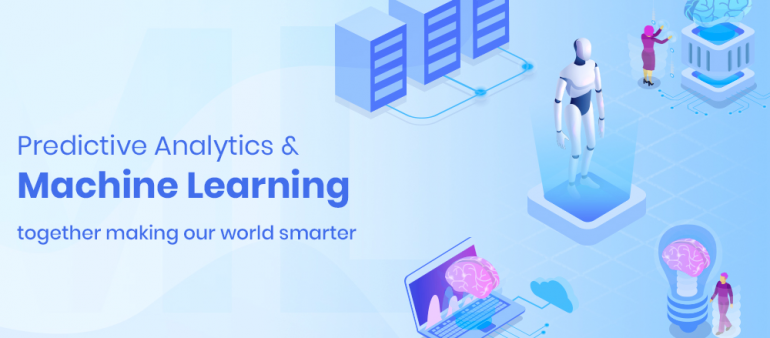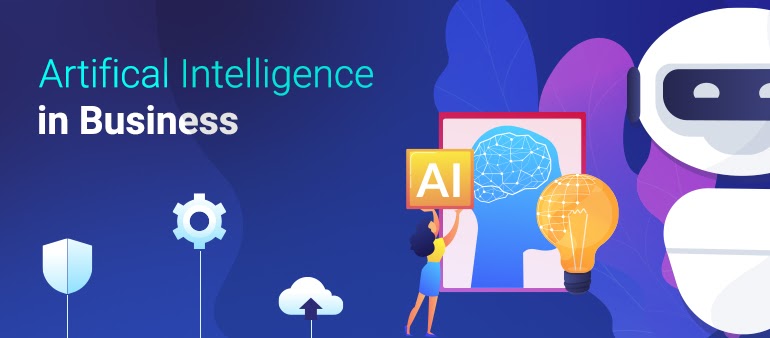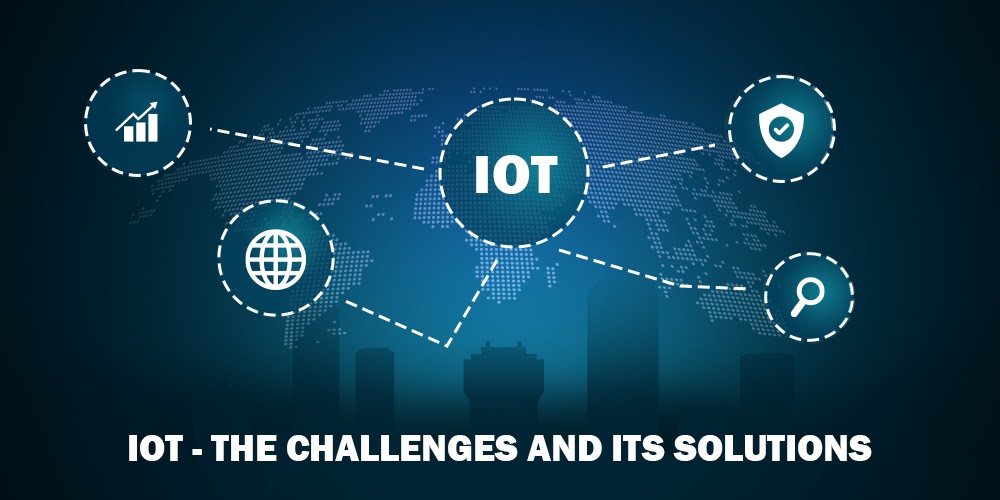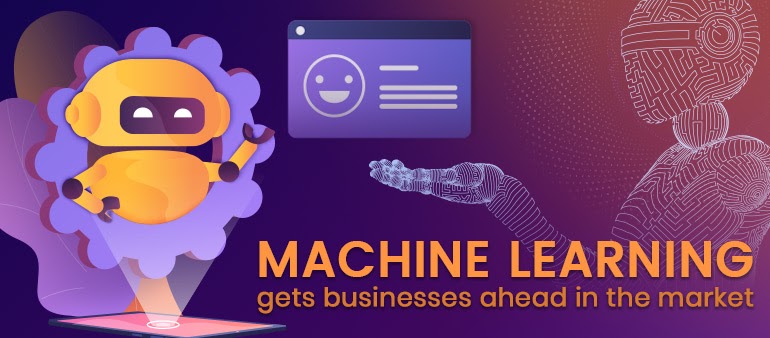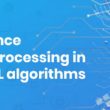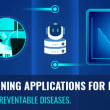As machine learning (ML) is evolving at a fast pace now, predictive data analytics is also quickly finding a way to enter into real world applications. Predictive data analytics, as the name suggests, helps predict future outcomes based on historical and current data. The data is first cleaned and given a structure so that it can be plugged into machine learning algorithms to identify patterns, discover relationships, forecast trends, find associations, etc., aimed at accurately predicting future outcomes. As a humongous amount of data is involved, Big Data and business intelligence tools also play a big role in making predictive data analytics accurate. Let’s look into some exciting applications of predictive data analytics using machine learning across different industries.
Note: Predictive analytics does not mean the models always predict a future outcome accurately. It means that they make the best prediction based on data available and keep improving the accuracy with machine learning.
Applications of Predictive Data Analytics with ML across different Industries |
Predictive Analytics and ML in Finance

Many businesses in the finance sector have now started using predictive analytics for churn prevention, demand forecasting, personalized offerings, customer insights to identify new marketing opportunities and fraud prevention. It can help finance businesses predict the extent to which customers will engage in a particular direct marketing promotion by harnessing historical data, such as customer information, their location, purchase history, how they responded to previous promotional campaigns, or their engagement rate. This way businesses can derive actionable insights for deciding which product to promote, when to promote and whom to target with high chances of conversion. Predictive analytics has already started impacting CRMs to improve relationships with customers and increase conversion rates.
Predictive analytics can also help detect frauds as intelligent systems can monitor customer transactions and flag those that have anomalies in standard customer behaviour, such as transaction history and the geographical locations of those transactions. Customer service is another area where finance businesses can greatly improve upon using predictive analytics. For example, Bank of America and Fargos are using chatbots with natural language processing (NLP) capabilities to handle several individual customer queries. By building chatbots, insurance companies can allow customers to check when their next premium is due and also get quotes. Credit scoring, sophisticated evaluation of loan applications and personal finance management (PFM) are some other applications of predictive data analytics with machine learning that are increasingly getting popular in the finance sector. More and more financial institutions will employ predictive analytics in the near future to improve customer experience in many ways.
Predictive Analytics and ML in Healthcare

There’s a wide scope of predictive analytics in the field of healthcare and medicine. Data processing in AI and ML algorithms paves the way to diagnose diseases earlier than a serious episode later, which will greatly avoid the risk of long-term health problems that are difficult and costly to treat. Researchers at the University of Pennsylvania Health System have developed a predictive analytics tool that uses machine learning and electronic health record (EHR) data to help identify patients highly likely to contract severe sepsis or a septic shock 12 hours before the onset of the condition. Senior author Craig Umscheid, MD, of the Hospital of the University of Pennsylvania, said, “The algorithm was able to do this. This is a breakthrough in showing that machine learning can accurately identify those at risk of severe sepsis and septic shock.” Similarly, a Philadelphia-based healthcare system Penn Medicine is using predictive analytics to develop a prognosis score. The predictive analytics model helps clinicians generate a score based on 30 factors to determine a patient’s likely prognosis over the course of next six months, allowing to recognize dangerous patterns early and proactively treat patients.
Predictive analytics also makes medical imaging faster and accurate. For example, researchers at Stanford University studied a machine learning algorithm which they say is capable of doing chest X-rays in a matter of seconds to detect 14 types of diseases. CheXNeXt, as the algorithm called, can also triage the X-rays to identify patients who need urgent care with accuracy on a par with the readings of radiologists. Besides, predictive models using EHR data can also help doctors assess the risk of patients not showing up for a scheduled appointment. So, by using predictive data analytics that leverages machine learning, care providers can actually build numerous health applications to greatly lift patients’ experience and avoid many premature deaths.
Predictive Analytics and ML in Manufacturing

Manufacturing industry already uses some sort of traditional analytics to understand their existing processes, but predictive analytics can help them forecast future performance. For example, predictive analytics models that rely on machine learning can bring the ability to monitor machinery by analyzing data generated through machine-to-machine communication and sensors in real time in order to assess efficiency and predict future breakdowns. IoT data collection and processing in ML algorithms will tell plant managers well in advance which machines are likely to experience a major malfunction, hence they will be able to repair or service such machines in time to avoid a dip in productivity because of some machines not working.
Apart from playing a role in keeping machines in good health, predictive analytics can prevent workplace injuries too, like by checking a machine remotely through sensors without any worker being near it, especially in hazardous locations. Predictive analytics can also analyze data of past incidents and based on their root causes, it can run potential scenarios and quantify risk factors. Other advantages in manufacturing include speeding up supply chain, demand forecasting, product or quality control, project management, reduced cost, plant uptime and many more. The possibilities that predictive analytics can bring to the manufacturing industry are huge and the sector is highly likely to adopt the practice in the next three years.
Predictive Analytics and ML in eCommerce

Predictive data analytics can positively impact eCommerce by providing the ability to get unparalleled insight into customers. Driving on the back of machine learning, predictive data models can get insights into customers through data generated from websites, mobile apps, social media, and the Internet of Things (IoT) in real time to run sentiment analysis and offer enhanced experiences. The ability to understand past behavior to promotional activities, purchase history, expectations, and desires helps create different profiles for customers and target them with personalized offerings. Besides, eCommerce owners, seeking expert Hyvä theme development services, can ensure that customers pay the highest price possible by analyzing data from customer activity, competitor pricing, available inventory, historical pricing, etc. Companies like Airbnb and Uber are already using predictive analytics to regularly do variable pricing in real-time.
Predictive analytics can also help eCommerce owners maintain the right inventory: neither overstocked nor understocked. By analyzing shopping trends, surge or dip in seasonal demand, historical patterns, and even political activities, predictive data models can accurately point towards which products need to be added to the stock to meet customer demands and which ones not to due to their low sales prediction. eCommerce owners can bring various other advantages to their way of doing business by using predictive analytics, such as fraud prevention, effective promotions, customer retention, correct recommendations, improved customer service and many more. Blockchain & AI development together can strongly address concerns related to data duplicacy, data security and frauds, which is why blockchain is now seen as the future decentralized apps.
Predictive Analytics and ML in Education

Education is one of the important sectors that will largely benefit from predictive analytics. For example, predictive analytics gives rise to adaptive learning. Teachers and lecturers can get insight into students’ academic records, engagement with online resources, current performance and learning gaps, and use it to customize the academic experience matching the potential of individual students for better learning. Educators can also perform better through feedback occurring more frequently.
Predictive analytics can also identify students highly likely to not reach standard attendance levels as early as their first semester or at risk of dropping out, thereby paving the way for college management to intervene and offer students help and support before it’s too late. Community colleges and other institutions of education can also effectively manage recruitment and enrollment using predictive analytics, which can statistically identify students most likely to apply, enroll and succeed based on various factors like geographic location, anticipated program of study, ethnicity, socio-economic status, high school grade point average (GPA), source of first contact and more. Education institutions can also narrow their marketing efforts by identifying and targeting specific high schools that have a high proportion of students most likely to enroll. More and more educational institutes are now adopting predictive analytics to transform operations and pedagogical approach for good.
Conclusion
Many businesses now understand the significance of using predictive analytics and have already adopted the practice to be no left behind in the competition which has become so fierce today. Predictive analytics, machine learning, IoT and Big Data are the future as they automate digital systems to make smart decisions like humans, and there’s no reason why businesses of today should not embrace them. Are you also looking forward to build predictive analytics that can leverage machine learning to help you make informed decisions and drive new business growth? Yes! That’s fantastic! Logic Simplified can help you build smart systems that use machine learning to accurately predict future outcomes and greatly improve the way you perform daily business operations. We are an Artificial Intelligence development company caterting to several businesses, ranging from finance to manufacturing, retail, customer service, gaming, security, energy, logistics & transport and tourism & education. We also offer Big Data analytics and IoT app development services that help train machine learning algorithms to make accurate predictions. For any query related to how we can help you build predictive data analytics and machine learning solutions, please write to us at enquiry@logicsimplified.com, we will soon get our experts talking to you to get you started for a smart future of your business.
 Get a Quote
Get a Quote

